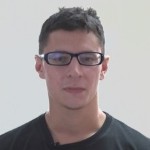Franck DI RIENZO
|
Dr. Franck Di Rienzo is associate professor at the Lyon 1 University, member of the Inter-University Laboratory of Human Movement Sciences (LIBM). He graduated in 2013, and obtained a 2-year post-doctoral contract at the French National Institute for Medical Research (INSERM). His research focuses on cerebral plasticity elicited by mental training interventions such as motor imagery (the mental representation of an action without engaging in its actual execution) and action observation, and their applications to motor performance enhancement in sports and sensorimotor recovery in rehabilitation. During his Ph.D., he developed skills in clinical rehabilitation research. He specialized in the use of magnetoencephalography to study cortical plasticity elicited by motor imagery training to promote cortical integration of new prehensile motor programs after C6-C7 spinal cord injury. During his postdoctoral fellowship, he investigated learning processes underlying the build-up of posture-movement coordinations in healthy adults using magnetoencephalography. He now develops research projects using electrophysiological measures of central and peripheral nervous system activities (electroencephalography, electromyography, skin conductance) to establish optimal mental training guidelines to leverage experience-dependent neural reorganizations. An original and promising research avenue is the development of biofeedback devices to allow the time-course investigation of neural plasticity elicited by mental training. Since 2016, he expanded his research topics to the influence of physical fatigue on cognitive motor processes. In November 2020, he had published 40 journal articles (cited > 1200 times), and his H index was 18. He is since 2014 an elected member of the research commission of the academic council of the Lyon 1 University.
|
Franck Di Rienzo (franck.di-rienzo @ univ-lyon1.fr)
Institution Université Claude Bernard (Lyon 1) Team: [MP3] Position Associate Professor
Publications |
1. Training through motor imaging during between-trials recovery periods during strength training allows for immediate gains in isometric force of 2 to 5%. 2. Spontaneous compensation and experience dependent plasticity are reflected in psychometric, behavioural and neurophysiological correlates of motor imaging following neurological lesions. 3. Cerebral plasticity indcued by motor imagiing favours the cortical intergration of new motor programs of grasping tasks following meduallary lesions at the C6-C7 level. 4. Associative parietal resgions control the updating of motor representations, which allow for posture-movement coordination during bimanual unloading tasks. | |



